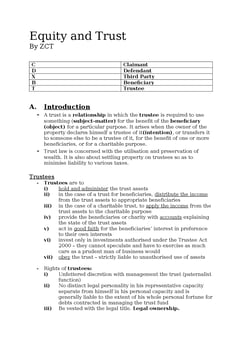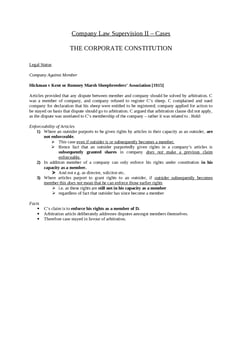Item Software v Fassihi [2004] EWCA Civ 1244
Judgement for the case Item Software v Fassihi
Table Of Contents
Defendant was director of Claimant. Claimant was in a distribution agreement with Isograph. When Claimant tried to renegotiate its terms with Isograph on more favourable terms, Defendant approached Isograph with idea of establishing new company to take over distribution agreement; however at same time, Defendant encouraged Claimant to take aggressive stance in negotiations.
Negotiations fell through, and Isograph entered new agreement with Defendant.
When Claimant heard this, alleged Defendant had not complied with duty to act bona fide in interests of company (pre-2006 law) by failing to disclose his misconduct to Claimant.
Held
Fiduciary duty to act bona fide in interests of company require Defendant to disclose his own or others’ misconduct to company.
-
Policy reasons support this extension of duty of loyalty:
Is economically efficient, as it means that company does not have to expend resources investigating directors’ conduct
Helps shareholders monitor activities of directors
Helps directors comply with their duty of oversight (e.g. Re Barings)
-
All directors’ duties are essentially extension of duty of directors not to benefit themselves at expense of corporation
Thus not unnatural to extend duty of loyalty in this way
Facts
Defendant had breached rule against diversion of corporate opportunity.
Thus on facts, is no way Defendant could have complied with his duty top act in best interests of company without telling Claimant of his plans to steal the contract from them.
RELATED CASES
For Further Study on Item Software v Fassihi

Equity notes fully updated for recent exams at Oxford and Cambrid...
Need instant answers? Our AI exam tutor is here to help.
Ask questions 🙋 Get answers 📔 It's simple 👁️👄👁️
Our AI is educated by the highest scoring students across all subjects and schools. Join hundreds of your peers today.
Get StartedSimilar Cases
Related Product Samples
These product samples contain the same concepts we cover in this case.

